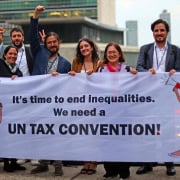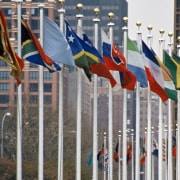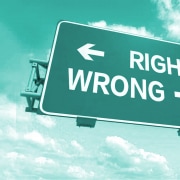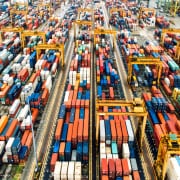|
Getting your Trinity Audio player ready...
|
In part 1 of our miniseries on strengthening public accountability, we focused on a recent discussion, titled Strengthening Political Integrity, which took place on 30 March 2022 at the 10th edition of the Organisation for Economic Co-operation and Development’s (OECD) annual global anti-corruption and integrity forum. Part 1 also highlighted the crisis that can ensue when public officials do not act with integrity, putting their own wants and needs ahead of those of the people they have taken an oath to serve.
In this second part, we hear practical suggestions from the OECD guest speakers at that session, based on their experiences in their respective careers.
“Corruption has become complex and sophisticated. If we want to restore integrity, we have to go beyond the classical and traditional recipes,” said Transparency International chairperson Delia Ferreira Rubio. “Those rules are not enough any longer – especially if they are not properly enforced, or if they are full of windows of opportunities for the crooks.”
OECD secretary-general Mathias Cormann agreed, saying: “Corruption is a moving target. To fight it effectively we also have to keep moving.”
Using power and authority for the greater good
Speaking truth to power is never easy, said Kathryn Stone, the UK’s parliamentary commissioner for standards. “But it’s essential for enforcing integrity standards for political leaders.”
She likened her fellow panellists, and all colleagues working in this arena, as becoming the collective conscience of their countries, impressing upon public servants that accountability, leadership, openness, honesty, integrity, selflessness, and objectivity are the essential principles that they must abide by.
“All conversations about private gain from public services follow from an understanding that serving the electorate and promoting democracy is a noble calling, which must be the primary ambition of all our elected representatives. Those elected must exercise moral restraint not to fall prey to the temptations presented to them by those seeking to influence or to buy influence.”
Using power and authority for the greater good rather than for personal gain is vital to preserve trust and confidence in the democratic process across the world, Stone added.
Political integrity can thrive when the integrity system provides clear and common definitions, sets integrity standards for political leaders and also clarifies the institutional responsibilities for developing implementing and enforcing and monitoring the different elements of the system. The South African government has various tools and mechanisms in place, including codes of conduct for all public servants, handbooks on what to do and what not to do, integrity committees, and yet…
The efficacy of such tools, as Stone intimated, depends to a large degree on the integrity of the people using them. The choice to overlook the rules is not hard for a person with low ethical standards, and in many cases, such a person has been appointed for political reasons, rather than because they were the right person. The vast state capture network of public and private sector players, set up over many years and exposed in shocking detail by the judicial commission established to investigate the phenomenon, is a prime example of pliant, unethical individuals appointed to decision-making positions to further a particular agenda rather than serve the needs of the people.
Corruption Watch’s ongoing campaign for transparent, merit-based appointments, particularly in anti-corruption institutions, is starting to bear fruit but there is still a long way to go. The appointment in March 2022 of General Fannie Masemola as the national police commissioner was not wholly transparent – but other appointment processes in which the organisation has pressed for transparency and public participation, and played a role, include that of the inspector-general of intelligence, the auditor-general, and the deputy public protector.
Looking for illicit gains and unexpected wealth
Another measure that can be used, said Didier Migaud, president of France’s Haute Autorité pour la transparence de la vie publique (High Authority for the Transparency of Public Life), is assessment of wealth of public representatives, or as South Africa knows it, lifestyle audits. “The declaration of their wealth is what we look at to check that it is correct, that the declaration is total and that it is honest, and to make sure that there have not been any illicit gains in this wealth. We also take a look at the interests that have been declared by the person.”
The South African government stated in March 2022 that from 1 April lifestyle audits would be compulsory for all national and provincial departments. By doing so, said public service and administration minister Ayanda Dlodlo, “the public service demands of its employees to reconnect with the values espoused in the Constitution”.
Lifestyle audits are one part of the government’s broader drive to professionalise, modernise and optimise the public service, she said. “Lifestyle audits will not only probe unexplained wealth, but it will also detect conflicts of interests that have an impact on the productivity of public service employees and on service delivery. Thus, although lifestyle audits are a mechanism or tool to address corruption, in its essence, it is aimed at restoring ethics to be at the centre of the public service.”
Preventing conflicts of interest
The Haute Autorité, said Migaud, is an independent organisation responsible for ascertaining and preventing potential conflicts of interest among French public servants. It has around 2 400 public interest representatives in its register, with about 40 000 actions declared. “Those are our tools. We also keep an eye on any occupational changes in career on the part of ministers or cabinet ministers or high public officials of the French Republic. And our opinions can be binding on the administration.”
The final guest speaker was George Hyzler, currently serving as Malta’s first commissioner for Standards in Public Life. “What is needed for political leaders to rebuild public trust? From where I stand, I would say a greater sense of integrity, the sense of doing what is right, even in one’s personal life. There should be awareness of consequences for misconduct, shouldered by the individual himself rather than waiting for the institutions like ours to take action.”
Politicians should obviously respect the rule of law, he said, acknowledge that the law applies to everyone equally, and act accordingly.
“Ultimately, trust is based on the belief that institutional and particularly government leaders will do the right thing, will keep promises, and not promise what cannot be delivered. If they don’t do that, there should be consequences.”
This doesn’t usually happen, Hyzler conceded. “Hence the need for a strong integrity infrastructure. Integrity systems should ensure that anyone who has not acted correctly will shoulder responsibility, and if not, there should be sanctions.”
The infrastructure should be independent, non-partisan, and its members fearless, said Hyzler.
Be careful of who is elected into power
Ultimately, said Stone, it is important to remember that codes and processes aren’t the only way to promote trust and confidence. “The way in which our elected representatives behave is vital to ensure that public service is worth so much more than private gain.”
So in the end, it seems to depend heavily on people’s behaviour and choices – which is not a disaster provided that transgressions are correctly and swiftly managed.
“Politicians are human, they, they tend to fall into the same traps and commit the same mistakes that normal human beings commit,” said Hyzler. “The solution is that we should be very, very, very aware of who we are electing to power. If people are elected to power who already have a track record of corruption or a loose sense of what is right then we are obviously taking a risk. The first hurdle, then, should be who is admitted, who is voted in, because we are all part of democratic governments.”
In South Africa it has happened time and again that people are appointed to important positions while they are known to have dubious pasts or worse, are still in the process of a disciplinary hearing or other process even as they get promoted or transferred. This practice, far too common around the world, is not conducive to building the public’s trust or instilling confidence that good governance will win the day.
The second step, Hyzler said, is that “if you’re caught doing something wrong, then you’re out.”
It is a basic rule, he added. “It doesn’t make sense to be caught doing something and you just hang on. So if anybody is caught with his hand in the till, he’s out. And if he doesn’t resign, there should be consequences. You should resign as a result of free will. But if that doesn’t work, then there should be consequences imposed.”








